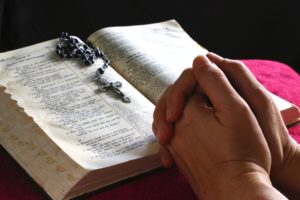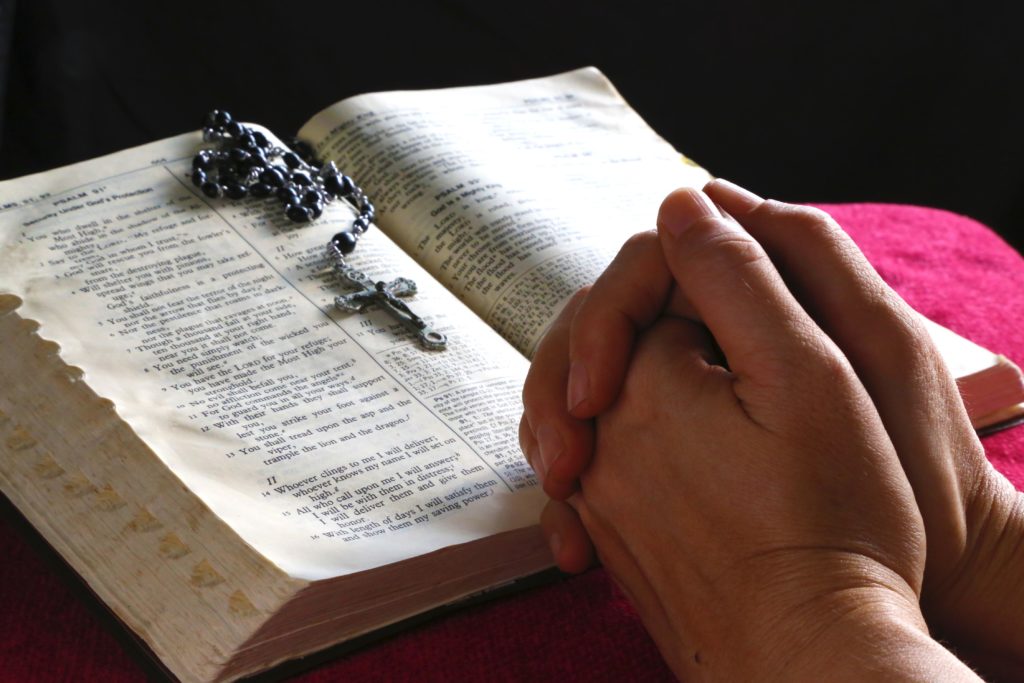Does Becoming a Baha’i Betray Jesus?
David Langness•Jan 6, 2015

…blind imitation of the past will stunt the mind. But once every soul inquireth into truth, society will be freed from the darkness of continually repeating the past. – Abdu’l-Baha, Selections from the Writings of Abdu’l-Baha, p. 248.
…blind imitation deadens man’s senses, and when an untrammeled search for reality is made, the world of humanity will be released from the shackles of blind imitation. – Abdu’l-Baha, Letter to Martha Root.
…blind imitations and hereditary prejudices have invariably become the cause of bitterness and hatred and have filled the world with darkness and violence of war. Therefore we must seek the fundamental truth in order to extricate ourselves from such conditions and then with illumined faces find the pathway to the kingdom of God. – Abdu’l-Baha, Baha’i World Faith, p. 239.
Girl-reading-bibleWhen I met Mary, we talked about the fear that comes from changing your innermost beliefs. Growing up a Catholic, she developed a childhood love for Jesus Christ that she still feels, and I suspect she fears that “changing religions” could betray that love.
I didn’t get a chance to explain much when Mary and I talked, so I’ll try to cover that subject here.
If you ask yourself why you follow a particular religion or belief system, you may find, like most people do, that you follow it because you inherited it. Your parents and your ancestors passed it down to you. You were probably educated and trained as a small child to follow the Faith of your parents or your grandparents, so you simply did. As you grew up, you likely saw some of the beauty of that Faith, tried to understand and follow its teachings, and built a self-identity that included its particular view of the world. If your parents had no Faith, you might have followed that path, as well.
In either case, your innermost beliefs may be counterfeit. They may not really belong to you. They may be blind imitations. If you haven’t questioned them since childhood; if you haven’t really examined your own deep spiritual reality, then you may want to seek that inner truth by beginning to question what you’ve blindly imitated in the past.
When the Baha’i teachings ask us to avoid blindly imitating others, they also ask us to examine our innermost belief systems. Rather than an imitation set of principles and beliefs, wouldn’t you rather have an authentic one? A major principle of the Baha’i Faith, the independent investigation of the truth, asks us not to rely on the perceptions and positions of others, but to truly seek and find our own beliefs:
Man must be just. We must set aside bias and prejudice. We must abandon the imitations of ancestors and forefathers. We ourselves must investigate reality and be fair in judgment. – Abdu’l-Baha, The Promulgation of Universal Peace, p. 346.
That justice and fairness means that Baha’is follow all of God’s prophets. Baha’is believe in, love and revere the prophets and founders of all the world’s great Faiths: Abraham, Moses, Krishna, Buddha, Zoroaster, Jesus Christ, Muhammad and now, Baha’u’llah. Becoming a Baha’i, then, does not mean rejecting the Faith you previously followed. Baha’is don’t jettison their former Faiths, they see them in a new way—as an integral part of the oneness of all religions. To a Baha’i, the fundamental reality of religion is one, and not multiple.
Actually, being a Baha’i means becoming a follower of the light, not of the lamp:
…the divine religions of the holy Manifestations of God are in reality one, though in name and nomenclature they differ. Man must be a lover of the light, no matter from what dayspring it may appear. He must be a lover of the rose, no matter in what soil it may be growing. He must be a seeker of the truth, no matter from what source it come. Attachment to the lantern is not loving the light. – Abdu’l-Baha, The Promulgation of Universal Peace, p. 151.
So I explained to my new friend Mary that she had nothing to fear. When you become a Baha’i, you don’t reject your former Faith or its founder—you truly accept them and at the same time vastly expand the scope of your beliefs, encompassing the guidance and wisdom of all Faiths:
O thou seeker after truth! The world of the Kingdom is one world. The only difference is that spring returneth over and over again, and setteth up a great new commotion throughout all created things. Then plain and hillside come alive, and trees turn delicately green, and leaves, blossoms and fruits come forth in beauty, infinite and tender. Wherefore the dispensations of past ages are intimately connected with those that follow them: indeed, they are one and the same, but as the world groweth, so doth the light, so doth the downpour of heavenly grace, and then the Day-Star shineth out in noonday splendour. – Abdu’l-Baha, Selections from the Writings of Abdu’l-Baha, p. 58.
Baha’is don’t deny any of the messengers of God, because they each represent the promised return of God’s message. Linked in an eternal chain of divine educators, the prophets and founders of the world’s great Faiths personify a single spiritual system:
Let us understand what constitutes the reality of the divine religions. If a Christian sets aside traditionary forms and blind imitation of ceremonials and investigates the reality of the gospels, he will discover that the foundation principles of the teachings of His Holiness Christ were mercy, love, fellowship, benevolence, altruism, the resplendence or radiance of divine bestowals, acquisition of the breaths of the Holy Spirit and oneness with God. – Abdu’l-Baha, Foundations of World Unity, p. 105.
So no, Mary, becoming a Baha’i doesn’t betray Jesus in any way—it truly recognizes Christ’s reality.
It is clear and evident to thee that all the Prophets are the Temples of the Cause of God, Who have appeared clothed in diverse attire. If thou wilt observe with discriminating eyes, thou wilt behold Them all abiding in the same tabernacle, soaring in the same heaven, seated upon the same throne, uttering the same speech, and proclaiming the same Faith. – Baha’u’llah, Gleanings from the Writings of Baha’u’llah, p. 51.
The opinions and views expressed in this article are those of the author only and do not necessarily reflect the opinion of BahaiTeachings.org or any institution of the Baha’i Faith.
WRITTEN BY
David Langness writes and edits for BahaiTeachings.org and is a journalist and literary critic for Paste Magazine. He and his wife Teresa live in the Sierra foothills in Northern California.

